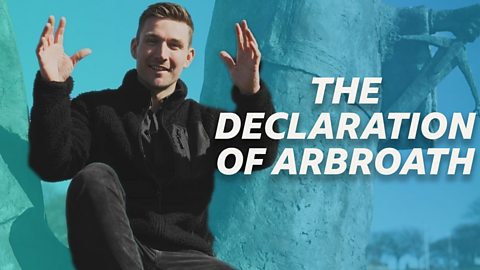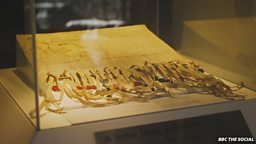The Declaration o Arbroath is the maist important letter ye havnae heard o
By Alistair Heather | �������� The Social Contributor
(See below for the English version of this article)
wis pit thegither at Arbroath Abbey in 1320, an sent aff tae the Pope. It gied Scottish arguments aboot how the freedom-lovin Scots were ane o the great ancient nations o the earth, an how they’d fecht against English domination “fur sae lang as but ae hunner o us aye draw breith”.

The Anniversary Of The Declaration Of Arbroath
How much do you actually know about the Declaration of Arbroath?
So how come ye havnae heard o it? We’ll get tae that. First, let’s tak a keek at this letter that some cry ‘Scotland’s birth certificate’.
Robert the Bruce had tane Scotland’s throne wioot legal richt durin the Wars o Scottish Independence, an wis ainly jist hingin on tae it, wi nobles conspirin ahind his back on ilka side.
Robert the Bruce had tane Scotland’s throne wioot legal richt durin the Wars o Scottish Independence, an wis ainly jist hingin on tae it, wi nobles conspirin ahind his back on ilka side.

The Pope - wha wis sortae like the United Nations in thae deys, the heid arbiter in international affairs - had excommunicated The Bruce lang syne, an didnae recognise his kingship.
The English king, Edward I, then his laddie, Eddie II, had aaready flattened baith Wales an Ireland an wantit tae claim overlairdship o Scotland tae complete the Celtic treble. Bruce’s victory at Bannockburn had gied the English a bluidy neb, but hadnae stopped the southern invaders permanently. Wioot the Pope’s support, they’d be back.
Scotland’s best screivers were the clergy, their skills shairpened in the ecclesiastical stooshies in Europe. They were chairged wi changing the Pope’s mind. They gaithered a quiver o arguments an loosed them in the letter we ken the dey as the Declaration o Arbroath.
There’s muckle tae tak tent o in the letter. In 14th century Europe, kings were maistly seen as apointit bi God. The Declaration gies The Bruce kingship on this basis, but, crucially, wi a condition. Whit’s kent as ‘The deposition clause’.

Robert is king. But if he tries tae pit us in “thirldom tae the King o England or the English” then we’d “drive him oot as oor enemy” an “mak some ither chiel … oor King.”
Robert is king. But if he tries tae pit us in “thirldom tae the King o England or the English” then we’d “drive him oot as oor enemy” an “mak some ither chiel … oor King.”
Noo, ye couldnae just pick yer ain king in thae deys. This wis revolutionary stuff fae the Scots.
There’s also this stoater o a line. It’s “no fur glory nor siller nor honours that we fecht, but fur freedom alane, which nae honest chiel gies ower but wi life itsel.” The Scots were drawin upon ancient concepts o freedom -baith individual an national – as justification tae fecht, an no jist fir laun or gear.
Aa this big talk wis leavened wi a daud o humility. The letter telt the Pope that we just wantit the English tae “lea us Scots in peace; we Scots whae bide in this puir wee Scotland - ayont which there is nae bidin-place at aw - an whae covet nocht but oor ain.”
Whit richt-heidit Pope wad reject this?
The Declaration softened the Pope tae the Scots cause, an it wisnae lang afore he cam on-side. Wi Papal support, Scottish independence wis secured afore the decade wis oot.
Its significance is baith historical an contemporary, international an local.

The Declaration can be tane as oor emergence as a distinct fowk wi a distinct sense o wirsels. It is ane o the cornerstanes o the Scottish nation that we’ve grown intae the dey.
“lea us Scots in peace; we Scots whae bide in this puir wee Scotland - ayont which there is nae bidin-place at aw - an whae covet nocht but oor ain.”
In 1998 the United States senate pit intae law that the anniversary o the Declaration o Arbroath (6th April) wad be the date fir their celebration o Scottish Americans, kent as Tartan Day. Ae senator claimed the “American Declaration of Independence was modeled on that inspirational document”.
It also has huge local significance. I mind ma first visit tae the Abbey, an bein telt aboot the Declaration. I couldnae believe that ma scaffy wee corner o Angus had aince been at the hairt o European philosophical an political argument. The ruins o the Abbey, the hail toun, ma hail pairt o Scotland taen a new significance, an a new potential in ma heid.
So how come ye havanae heard o it? Weel, Scottish history is re-emergin aifter a lang period o amnesia an ignorance. Whaur at ae time Scottish history wis seen as a quiet an couthie wee lane leadin aff the main thoroughfare o English or British history, it is noo an industry unto itsel. Slavery, empire, art, philosophy are aa bein revealed as pairt o oor heritage, as oor investigations grow mair sophisticatit. This sophistication is gien us a better sense o the importance o that letter fae Arbroath.
I couldnae believe that ma scaffy wee corner o Angus had aince been at the hairt o European philosophical an political argument.
In oor process o national rediscovery the Declaration o Arbroath is bein recognised as a key foundation stane, as we attempt tae understand whaur we really cam fae.
The Declaration of Arbroath is the Most Important Letter You’ve Never Heard Of.
The Declaration of Arbroath is the most important letter you’ve never heard of. It was written at Arbroath Abbey in 1320, in the midst of the Scottish Wars of Independence, and was sent to the Pope. In beautiful, passionate prose laced with potent political philosophy, the Scots set out their stall: we reject English claims of overlordship, as we Scots are one of the great, ancient and free nations of the earth. And we will defend that position if we have to, for “as long as but one hundred of us remain alive.”
This letter has been called by many ‘Scotland’s birth certificate’. So why haven’t you heard of it? We’ll get to that. First, context.
The Wars of Independence had raged for decades, grinding down a weary country. William Wallace rose and fell. Robert the Bruce had seized the throne and managed – just – to keep it.
The Pope was supporting English claims of overlordship. This mattered. The Pope had massive sway in international affairs. Scotland had to find a way to get him on-side.
Edward I of England had flattened both Wales and Ireland, and his son Eddie II was looking to complete the Celtic treble by obtaining overlordship over Scotland too. Scottish victory at Bannockburn had bought the Scots time and space, but without the Pope’s support, the mighty English army would be back.
Scotland’s chief political philosophers – clergy who had sharpened their wits abroad in the great ecclesiastical debates – were charged with changing the Pope’s mind. They loosed their most pointed arguments in the letter we now know as the Declaration of Arbroath.
There is much in the letter that is remarkable and unique. For example, in the 14th century, Europe’s kings were generally considered appointed by God alone. The Declaration makes clear that The Bruce was God’s choice, but, crucially, there’s a condition thrown in. What’s known as ‘the deposition clause.’
As the letter has it, Robert was made king with the “assent of us all”. But should The Bruce fail, or submit to the invader, the Scots would “exert ourselves at once to drive him out as our enemy” and ‘make some other man… king’.
You couldn’t just fire a dud king in 1300s Europe. This was revolutionary stuff from the Scots.
The Scots justified their continued resistance with this total stoater of a line: “It is in truth not for glory, nor riches, nor honours that we are fighting, but for freedom alone, which no honest man gives up but with life itself.” This drew upon ancient notions of individual and national freedom, and would’ve bolstered the letter.
This big talk was cut through with well-judged. All we wanted was for the English to “leave us Scots in peace, who live in this poor little Scotland, beyond which there is no dwelling-place at all, and covet nothing but our own.”
The Scots were laying it on thick. And to great effect. The letter softened the Pope to the Scots cause, and he began to intervene on our behalf with the English king. Within the decade, Scotland’s independence was confirmed.
Its significance is international. April 6th, the anniversary of the Declaration, is celebrated in the United States and Canada as Tartan Day and is marked by a parade in New York city. One American senator claimed the “American Declaration of Independence was modeled on that inspirational document”.
It has huge local significance. My first visit to the Abbey, learning about the declaration, was incredible. I could not believe that my scaffy little corner of Angus had been at the heart of heated philosophical debates with popes and kings. This knowledge infused the ruins with meaning for me, and transformed what I saw as my humdrum surroundings into a place packed with prestige and potential.
Its national significance is clear. So, why are you just hearing of it now? Well, Scotland is having a bit of a coming-of-age around its own history. Old myths are being overturned and new narratives developed. A new confidence and sophistication of enquiry is helping reveal the importance of this letter from Arbroath to new generations.
In this process of national rediscovery, the Declaration of Arbroath is being revealed as a key foundation stone, as we attempt to rebuild the story of where we really come from.




